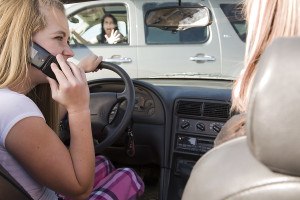U.S. Transportation Secretary Ray LaHood called on Thursday for a federal law to ban talking on a cell phone or texting while driving any type of vehicle on any road in the country.
Tough federal legislation is the only way to deal with what he called a “national epidemic,” he said at a distracted-driving summit in San Antonio, Texas, that drew doctors, advocates and government officials.
LaHood said it is important for the police to have “the opportunity to write tickets when people are foolishly thinking they can drive safely or use a cell phone and text and drive.”
LaHood has previously criticized behind-the-wheel use of cell phones and other devices, but calling for a federal law prohibiting the practice takes his effort to a new level.
The National Highway Traffic Safety Administration estimates that 3,000 fatal traffic accidents nationwide last year were the result of distracted driving. Using a cell phone while driving delays reaction time the same amount as having a blood alcohol concentration of .08, the legal limit, the highway agency said.
But Gary Biller, president of the National Motorists Association, said laws banning specific actions like talking on a phone or texting are not necessary because those actions are already covered by existing distracted-driving laws. It would be more productive, he said, to invest resources in campaigns that discourage inattentive driving in general.
“It shouldn’t matter if the driver is distracted by a conversation with another vehicle passenger, tuning the radio, eating a snack, or talking on a cell phone,” Biller said in a statement. “Existing laws cover all those distractions and more.”
LaHood said, however, he was not as concerned about people who eat, apply makeup, or perform other distracting activities in cars because “not everyone does that.”
“But everyone has a cell phone and too many of us think it is OK to talk on our phones while we are driving,” he said at the summit, sponsored by insurance company USAA, the Texas Department of Transportation and Shriners Hospitals for Children.
LaHood was joined by people who have been hurt in accidents caused by motorists talking on cell phones, including children in wheelchairs who were paralyzed. Such accidents are “100 percent preventable,” he said.
He compared the situation facing the United States today with the problem of drunk driving 20-30 years ago.
“It used to be that if an officer pulled you over for drunk driving, he would pat you on the back, maybe call you a cab or take you home, but he wouldn’t arrest you,” LaHood said. “Now that has changed, and the same enforcement can work for people who talk on cell phones while driving.”
Thirty-eight states have laws restricting or outlawing the use of electronic devices while driving, LaHood said.
LaHood said his department was researching the effect that hands-free devices and new systems like Ford Motor Company’s Sync have on distracting drivers. He said he has called the CEOs of major car companies and encouraged them to “think twice” before placing too many Internet-based systems into new cars.
(Editing By Corrie MacLaggan and Philip Barbara)
Was this article valuable?
Here are more articles you may enjoy.

 Elon Musk Alone Can’t Explain Tesla’s Owner Exodus
Elon Musk Alone Can’t Explain Tesla’s Owner Exodus  Canceled FEMA Review Council Vote Leaves Flood Insurance Reforms in Limbo
Canceled FEMA Review Council Vote Leaves Flood Insurance Reforms in Limbo  US Will Test Infant Formula to See If Botulism Is Wider Risk
US Will Test Infant Formula to See If Botulism Is Wider Risk  UBS Top Executives to Appear at Senate Hearing on Credit Suisse Nazi Accounts
UBS Top Executives to Appear at Senate Hearing on Credit Suisse Nazi Accounts 